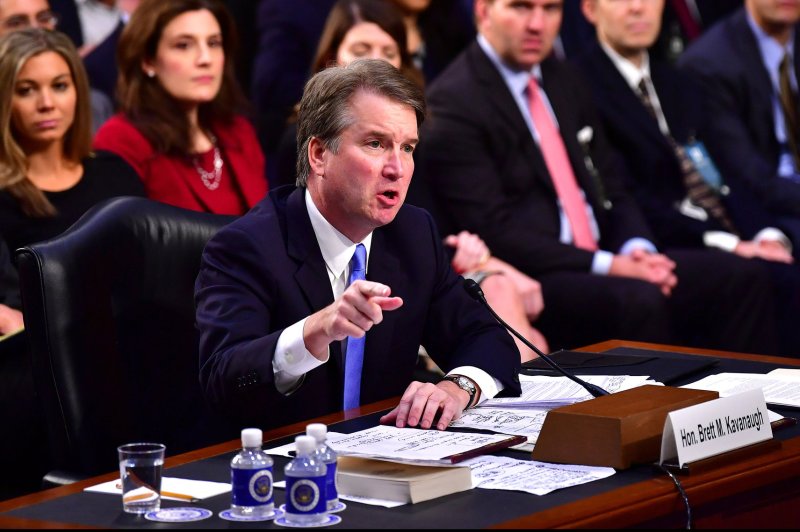Supreme Court Justice nominee Brett M. Kavanaugh testifies on the third day of his Senate Judiciary Committee confirmation hearing, on Capitol Hill in Washington, D.C., on September 6. Photo by Kevin Dietsch/UPI |
License Photo
Make no mistake: To be overly dramatic, the hearing to confirm Judge Brett Kavanaugh as a Supreme Court associate justice has metaphorically pulled the pin from what could be a political nuclear hand grenade. The damage could extend far beyond the future of this nominee and the confirmation process. Indeed, an inadvertent target could be the Constitution itself and the ability of our government to govern.
This is not a bridge too far. Osama bin Laden attempted to use our laws against us after Sept. 11 by exploiting the tension between civil liberties and security. This led to measures that impinged on the former to protect the latter.
Today, the implications of 36-year-old allegations of sexual misconduct filed by Christine Blasey Ford against Kavanaugh are potential precursors for assaults on our Constitution and the basis of government for which we may not be prepared.
First, the constitutional presumption of innocence is at risk, especially when challenged by the probable lack of dispositive evidence or proof of guilt of whether Kavanaugh committed any of the acts claimed by Ford. This is far different than in 1991 when Judge Clarence Thomas was accused by Anita Hill, a former staffer, of sexual harassment. Thomas was still confirmed 52-48.
But Hill's claim did not date back 36 years. Nor did social media exist in which the most scurrilous charges, allegations and falsehoods could be instantaneously distributed to hundreds of millions of people. If they had, Thomas may not have been on the high court.
Second, the political process is at greater risk through false allegations. Assertions count. In 2004, John Kerry's presidential campaign was damaged when he was "swift boated" and his heroism in Vietnam cynically used to assassinate his character. In an information age, the danger is weaponizing negative campaigning that is as old as the nation, taking it to new levels of influence.
Third, there is a far greater danger. The Russians and others wishing us ill have penetrated our politics and elections. How much this interference has influenced votes or public opinion is not known. However, propaganda, disinformation, misinformation and misdirection are part of this playbook. In a social media age, it is not difficult to construct scenarios that could harm the social and political fabric of any society and particularly America's.
Suppose on Oct. 30, 1938, a global social media existed. Orson Welles' Mercury Theater radio broadcast of War of the Worlds created panic across segments of the country. Consider the impact today of digitally produced vidoes of Welles' imaginary alien space craft destroying New York flashing across the Internet; Facebook, Whatsapp and other sources. Or images of pandemics, natural disasters and catastrophic events filling the media. Before these images were revealed as hoaxes, how much disruption and chaos would have been created?
Digital manipulation to change or to falsify data and information is even more frightening. Doctored newspaper articles alleging past transgressions and altered corporate records would be fair game. Altering annual company reports, quarterly earnings statements and stocks is another. This is no longer technically impossible.
Of course, these scenarios are a huge leap from Ford's allegations that have roiled the confirmation process and posed nearly impossible choices for senators on the committee. Who is to be believed? No doubt Kavanaugh absolutely believes he is innocent. Conceivably, he could have been intoxicated and does not remember.
Ford may have exaggerated the assault or misidentified the assailants. Or she could be telling the truth. Bad cases make for bad law. And this one will not turn out well no matter how it is decided. Yet, these larger implications cannot be ignored.
For foreign governments or adversaries, social media is a weapon to attack or to influence America in many ways. Moving decimal points to the left or to the right could cause stock markets to soar or to crash. False allegations could destroy politicians and move public opinion.
Whatever happens over this confirmation, the critical and unanswered question is how and when social media will be used to disrupt and potentially bring down our ability for self-governing. This hearing may simply be a one-off and these worries inflated. And then again they may not be.
Harlan Ullman has served on the Senior Advisory Group for Supreme Allied Commander Europe (2004-16) and is senior adviser at Washington, D.C.'s Atlantic Council, chairman of two private companies and principal author of the doctrine of shock and awe. A former naval person, he commanded a destroyer in the Persian Gulf and led over 150 missions and operations in Vietnam as a Swift Boat skipper. His latest book is "Anatomy of Failure: Why America Has Lost Every War It Starts." Follow him @harlankullman.















